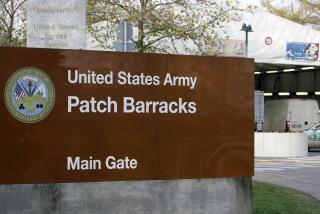Troops Warned of U.S. Man Tied to Extremists
- Share via
TUZLA, Bosnia-Herzegovina — U.S. and other forces involved in the multinational peace-implementation effort here are on the lookout for an American citizen known to sympathize with extremist Islamic causes and considered a possible security threat.
But spokesmen for the mission in Bosnia on Wednesday firmly denied reports that the troops have been put on a higher state of alert.
In recent days, a photo of an American citizen identified as Kevin Holt has been circulated among the troops, who were told they have no authority to arrest him but were ordered not to admit him to any installations used by the NATO-led Implementation Force, or IFOR, the peace-implementation force in the former Yugoslav federation.
“A leaflet has been passed to guards and security personnel on Tuzla Air Base and other IFOR areas in regards to a possible security threat to IFOR personnel and equipment,” the operation’s information office said in a statement.
The warning is necessary, said IFOR spokesmen, because U.S. soldiers might not suspect that a fellow American could be dangerous.
“If you have somebody sympathetic to extremist causes who is an American citizen and who looks like you and talks like you, this would be possibly someone who could slip into a group easier,” said Lt. Col. Chuck Merlo, an IFOR spokesman based in Sarajevo, the capital of Bosnia-Herzegovina. “I think that’s why there is a concern about him above and beyond the already high state of alert.”
But Merlo added: “They are already at a high state of alert, and that has not changed.”
Since being deployed in Bosnia, U.S. troops have maintained a high level of security--wearing helmets and flak jackets even on their bases and traveling in armored vehicles. No Americans in the mission have incurred life-threatening injuries or been killed to date.
Capt. Peter Hsieh, a spokesman for the NATO-led mission, whose American contingent is headquartered in Tuzla, said warnings like the one about Holt are common at other U.S. bases--even in Germany, where the security threat is considered much milder.
“You get these things every once in a while,” Hsieh said. “It’s pretty routine.”
The concerns about Holt are not new; he was involved in the harassment of U.S. Marines in Lebanon in 1983, according to U.S. officials who spoke on the condition that their names not be used. The advance team preparing for President Clinton’s visit to Tuzla earlier this month received a report that Holt might be in Bosnia.
The spokesmen also stressed that despite press reports, there is no perceived increase in the threat from the foreign Islamic fighters who participated in Bosnia’s long and bitter war and did not embrace the U.S.-brokered peace accord. Islamic extremist groups remaining in Bosnia last week were isolated in barracks and are being transported out of the country, they said.
In Washington, Defense Secretary William J. Perry told reporters: “We have had no reports of any terrorists or extremists actually trying to get into U.S. facilities.”
Perry referred to Holt as a “potential terrorist” but stressed that U.S. troops are prepared for any threats posed by such people.
In general, U.S. embassies and American travelers have been warned by the State Department of a possible threat to U.S. interests around the world by associates of Sheik Omar Abdel Rahman, the Egyptian militant who was sentenced last week to life in prison for directing a campaign of urban terrorism against the United States.
Times staff writer Art Pine in Washington contributed to this report.
More to Read
Sign up for Essential California
The most important California stories and recommendations in your inbox every morning.
You may occasionally receive promotional content from the Los Angeles Times.













